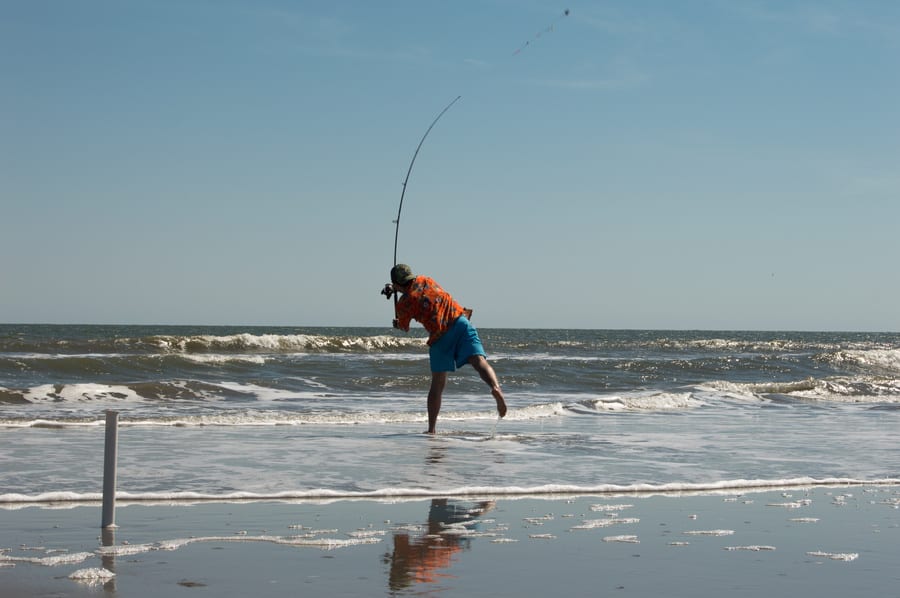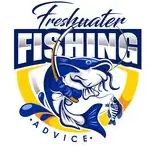Best Water Temperatures for Surf Fishing (Complete Guide)
Surf fishing is gaining in popularity and it is important to know how water temperature can impact your success. What is the optimum water temperature for surf fishing?
Generally, water temperatures between 60-75°F (15-24°C) are considered best for surf fishing. Striped bass and bluefish prefer cooler temps and seatrout, pompano, and red drum like it warmer.
In this article, we will discuss the best water and air temperatures for a variety of fish species while surf fishing.

Is Water Temperature an Important Factor in Surf Fishing?
Water temperature is one of the most important factors to keep in mind when surf fishing. There are a lot of different species of fish in the ocean, and they each have their own preferred range of water temperatures.
When water temperatures are too cold for fish, their metabolism slows down and they become very inactive. When water temperatures are too warm for fish, there are a few potential outcomes.
One outcome is that fish that are too warm will retreat to deeper, cooler water. If you are surf fishing, that will be a very limiting factor for you and will result in fewer bites.
Warm water does not hold oxygen as well as cooler water does, making it much more strenuous for fish to be active and feed. If the water is too warm, the fish that do not head for cooler water are much less likely to be interested in your bait.
Seasonal Water Temperature Guide for Surf Fishing
As the seasons change, so does the temperature. Even if you are in a region that does not necessarily see big changes in temperature from season to season, the change will still have an effect on water temperatures as well as what fish will be available due to their migration patterns.
Winter
Most water temperatures during the winter months are not going to be ideal for surf fishing. Some species of fish, like the whiting, can be caught year-round while surf fishing.
Otherwise, most shores on the east coast of the United States are not going to have many other species around.
Spring
Spring is one of the best times of year for surf fishing. As the water temperatures begin to warm with the change in season, fish will start moving back toward shore.
During this time fish will also be migrating to their summer homes. Some popular species of fish, like striped bass, start their breeding season during this time of year. In general, you will find fish much more active while shore fishing during this time of year.
Summer
While summer is not as bad a time for surf fishing as winter, it is still not a great time of year for surf fishing. As the temperatures continue to increase from the productive spring months, water temperatures will begin to get too warm for many species of fish.
As that happens, they will retreat to deeper, cooler waters. As you are limited to how far out you can fish when you are shore fishing, that is a very limiting factor for you.
In general, fish are not as active in warmer water. Cool water holds oxygen much better than warm water, so fish will tend to be less active as they will have a harder time recovering from strenuous activity.
Because of the biodiversity in the ocean though, there are of course some fish that do not mind warmer water. Fish like the tarpon are perfectly comfortable in warm water even up to 90 degrees.
I have found summer surf fishing can be hit or miss. A lot of fish move closer to shore but it often brings more swimmers into the water with you. If you can find a secluded beach, you’ll do well.
I also found a direct correlation between the abundance of sand crabs (sand fleas) in the surf and the number of fish I’d catch. Find the sand fleas and you’ll find fish.
Fall
Fall is another great time of year for surf fishing. During this time of year, massive amounts of bait fish can be found close to shore, and large predatory fish are not far behind them.
While water temperatures during this time start to trend towards the lower end of the preferred range of most fish, they still tend to be within that range. These factors contribute to a serious uptick in activity for a variety of fish.
Some would even argue that this is in fact the best time for surf fishing. As the larger, predatory fish can be found chasing bait fish, being able to find where the bait fish are is key. Look for an area with a lot of surface action.
That can be a spot where you see fish breaking the surface or possibly an area with a lot of sea birds congregating. Additionally, to catch the biggest fish it is recommended that you attempt surf fishing at night.
Growing up on the Jersey coast, I did a lot of fall fishing for striped bass and bluefish in the surf. I found water temperatures between 45-65 degrees meant good fishing.
Surf Fishing by Water Temperature
While you can break down fishing by different seasons throughout the year, one of the most important variables you need to monitor is water temperature.
Below 50 Degrees
Fishing in this range will not be ideal as most species of fish you typically find while surf fishing will not tolerate water temperatures this cold. Also, most species of fish that do hang around when the water temperature dips this low will be much less active.
That being said, it is still possible to catch fish when the water temperature is below 50 degrees. Some fish, like striped bass and mackerel, are known to take bait in colder water.
51 – 60 Degrees
Water temperatures this low are still not ideal for surf fishing, but the higher temperatures in this range are closer to the ideal range for surf fishing.
Fish will still be present in water this cool, but many species will not be available by surf fishing in this range. Fish like striped bass and red snapper can still be found in this range.
61 – 68 Degrees
This range of water temperature is excellent for surf fishing. While the lower temperatures in this range are closer to being too cool for most fish, they are still within their preferred range. You should be able to find most fish that are targeted through surf fishing in this range.
69 – 73 Degrees
This is prime time for surf fishing. The upper end of this range is a little close to the higher end of preferred water temperature for most fish, but it is still within range by a few degrees.
Most fish should be present and highly active if you are surf fishing in water temperatures in this range.
Above 74 Degrees
Fish will still be active in this range, and the bottom of this range is even still within the ideal range for surf fishing. However, once water temperatures start to reach 76 degrees and higher water will begin to be too warm for some species of fish.
For those that can not tolerate it or do not prefer it, they will retreat to deeper, cooler water. As you are limited in regards to range when you are surf fishing, it is not likely you will be able to reach fish that dive deeper in search of cooler water.
Additionally, it is worth keeping in mind how water retains oxygen. Warmer water does not retain oxygen as well, so you will find that most fish are not as active when water temperatures start to get too high. Some fish, like tarpon and snook, won’t mind and will still happily take your bait in water this warm.
Does Air Temperature Impact Surf Fishing?
Air temperature is not an important factor when it comes to surf fishing. Water temperature is extremely important though and should always be monitored if you are considering surf fishing.
You may want to consider your own personal comfort when you consider air temperature, but fish certainly won’t mind it.
Water temperature is important to consider not only for surf fishing in general, but individual species have preferred ranges as well. If you are targeting a specific species of fish, be sure you understand what their preferred range of water temperature is.
How Cold is Too Cold for Surf Fishing?
Surf fishing below 50 degrees is not ideal, but still not impossible. There are some fish you can catch while surf fishing that can tolerate water temperatures in the low 40s.
More likely than not, water and air temperatures would need to be unpleasantly or even dangerously cold for you yourself before it could be considered too cold for surf fishing.
It is worth noting though that below 50 degrees you are not going to find very many fish, both in number and variety.
While there are fish that can tolerate colder water, most fish become lethargic when water temperatures start to dip this low. Their metabolism will slow down and they will be much less active and as such less likely to take your bait.
How Warm is Too Warm for Surf Fishing?
Surf fishing above 76 degrees is not ideal. While there are certainly some fish, like tarpon, that don’t mind water temperatures that high, most fish will retreat to cooler water.
Warm water does not hold oxygen as well as cooler water, so even if fish do stick around they are going to be less active and less likely to take your bait.
As for the fish that do retreat to cooler water, you will be limited to how far out you can cast when you are surf fishing. Fish heading for deeper water have a better chance of being too far for you to catch.
Does Stormy Weather Impact Surf Fishing?
Pressure changes associated with stormy weather definitely affect surf fishing. Most fish have swim bladders, and pressure changes can cause a lot of discomfort for fish that do have them. To compensate for a drop in pressure, fish will dive deeper to alleviate their discomfort.
Fish can sense when a storm is coming before it actually arrives as air pressure begins to drop. When that happens they will start feeding voraciously before they dive deeper to wait out the storm.
Fishing just before a storm will yield excellent results. Just be sure to keep your own safety in mind, you will be out in the open when you are surf fishing and you are not likely going to be close to cover.
After a storm is also a great time for surf fishing. As fish have been hiding out in deeper water to wait out the storm, they will feed aggressively again to make up for the time they did not spend feeding during the storm.
For a complete breakdown of the best water temperature for fishing, check out this guide. For a complete breakdown of the best water temperature for redfish, check out this guide. For a complete breakdown of the best water temperature for flounder, check out this guide.
